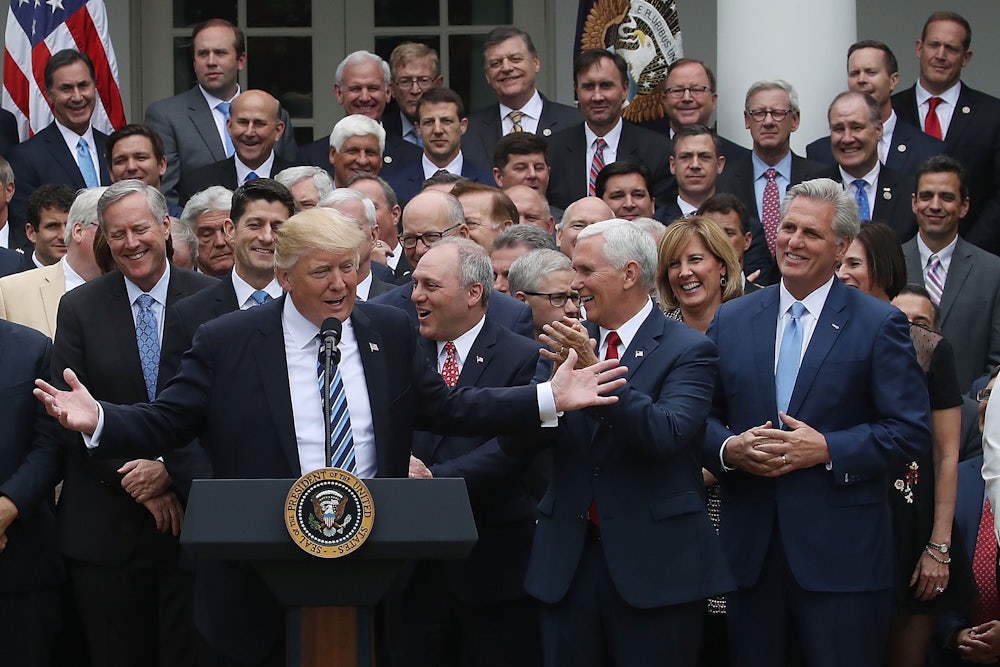President Donald Trump got what he wanted: a photo op in the Rose Garden. Surrounded by mostly middle-aged white male legislators, Trump exulted, “We have an amazing group of people standing behind me. They worked so hard and they worked so long. I said, let’s do this, let’s go out, just short little shots for each one of us and let’s say how good this plan is—we don’t have to talk about this unbelievable victory—wasn’t it unbelievable?” The exact nature of this win was secondary, not just for Trump but for congressional Republicans who—after years of promising to repeal Obamacare, and having failed in their first attempt earlier this year—finally passed the American Health Care Act. No matter that the Senate won’t even vote on the House’s bill—as the sports cliche goes, “A win’s a win.”
It was perhaps the most Trumpian moment of this presidency so far: the triumph of spectacle over policy.
The whole bizarre day unfolded like a cheesy B movie, beginning with a pep rally in the Capitol basement where congressmen blared inspirational music (including the theme from Rocky, “Taking Care of Business,” and “Eye of the Tiger”) beneath an image of General George Patton. “Let’s get this fucking thing done!” Representative Martha McSally, of Arizona, reportedly told her colleagues. And when House Republicans did get this fucking thing done, they celebrated like the kids in Friday Night Lights.
Cases upon cases of beer just rolled into the Capitol on a cart covered in a sheet. Spotted Bud Light peeking out from the sheet
— Alexandra Jaffe (@ajjaffe) May 4, 2017
If the entire event felt like a post-game kegger, that was because Trump had successfully recast the complex arguments around health care into simple win/lose terms. And yet, at best, this game is only at halftime.
They are rolling cases of beer into Capitol and coming to the White House afterwards for a celebration. Kind of remarkable. So far to go.
— Josh Dawsey (@jdawsey1) May 4, 2017
The story of the AHCA this week is that of a fledgling, historically unpopular president who desperately needed a political win, and thus convinced Republicans in Congress that the passage of any bill, no matter how flawed, was to their advantage. As Rachael Bade and Josh Dawsey reported at Politico, the need to rescue Trump’s failing presidency drove the push to pass the health care bill. Its actual policy details were irrelevant to Trump:
Trump did not want to talk about the merits of the legislation — he didn’t care much about those specifics, senior officials said. What mattered to him was how a failed vote would hobble his presidency and the ability to get other legislation through Congress.
He wanted a win.
Trump realized that his goal—a win at all costs—would also appeal to the disparate members of the House, ranging from House Freedom Caucus members who wanted a draconian bill to moderate Republicans who worried about alienating constituents who had come to depend on Obamacare. Trump assuaged nervous congressmen by arguing that the contents of the bill don’t matter, since the Senate has its own ideas. All that mattered was getting a win. Via Politico:
The president’s pitch was simple: If we don’t pass this, we’re going to be hurt down the road. He would also remind them that the bill could change in the Senate. And he warned lawmakers that voting “no” is just going to get them “more and more problems,” said one White House official who sat in for many of Trump’s conversations.
The end result was a bill sold on lies, with Republicans in open denial about the impact it would have on Medicaid recipients and people with pre-existing conditions. That 217 out of 238 House Republicans went along with this bill shows that despite their vaunted concern for policy, in the end they’re no different than Trump, eager for the appearance of victory in the short term, without regard to long-term consequences.
Yet the House’s passage of the ACHA is likely to be a short-lived victory. Because it was rushed through the lower chamber, the bill hasn’t been scored yet by the Congressional Budget Office. That will happen in the next couple of weeks, likely creating another round of negative headlines for Republicans. Meanwhile, the Senate says it won’t even consider the House’s bill, and will instead write their own.
Trump’s first few months in the White House have been a struggle between spectacle and reality. He’s a master showman who knows how to dominate the stage, and is willing to share the spotlight—as he did with House Republicans on Thursday—when it benefits the victorious narrative he wants to tell about his presidency. But his claims of victory are always premature; with the AHCA, as with many of his executive orders, Trump fails to realize that passing a bill or signing a piece of paper is never the end of the story. There are real-world consequences for these actions, and as the details emerge in public, they usually reflect poorly on him. Spectacle may win the ratings war for one day, but reality usually gets its revenge.
